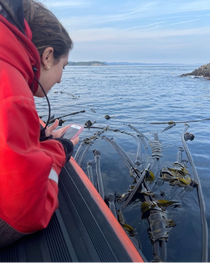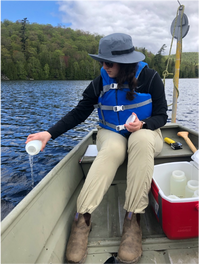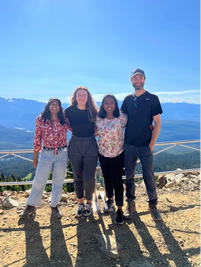|
World Water Week Insights By Hadeel Abed The forWater Network, as part of their mandate, trains young professional researchers through a series of educational and collaborative opportunities. Master’s and PhD students participate to further their understanding of the water industry and its intersections with land management and climate change impacts. For world water week, two young professionals from the Network share how this unique training model positions them for success in their future careers. Hadeel Abed shares how her Master’s research focused on cyanobacterial communities was improved by the experiential education training provided by the Network.  This year, I was part of a group of graduate students in the forWater Network fortunate enough to attend the third Source-to-Tap (ST3) training week on Vancouver Island in British Columbia. During the week participants were exposed to the inner workings of source water protection (SWP) for drinking water. The pan-Canadian transdisciplinary forWater Network connects students of different research backgrounds to improve their knowledge of how climate change-exacerbated disturbances, like floods, hurricanes, and wildfires, affect forested watersheds and the waters that flow through them. Experiential learning is the act of learning by actively engaging with the material instead of passively reading about it. This type of learning relies on four processes: experiencing, reflecting, thinking, and acting. During the training week, we were fortunate to spend considerable time interacting with experts in source water protection. Through this exposure we gained an understanding of the nuance of implementing SWP plans and insight into the challenges faced by water industry professionals, all because we were experiencing a glimpse of it directly. As young professionals attending this training, we could start to grasp the entire process involved in SWP, from start to finish (i.e., source to tap) and truly value the importance of maintaining forested source watersheds. "Through this exposure [interacting with industry professionals] we gained an understanding of the nuance of implementing SWP plans and insight into the challenges faced by water industry professionals, all because we were experiencing a glimpse of it directly." After each immersive experience, our group reflected on the complexities of source water protection and water treatment systems. We then could draw connections from the broader watershed scope to our individual research projects. By being exposed to this broader context, we could start thinking about the significance of our research and its potential to contribute to industry performance improvements. During the training week, SWP was not a theory in a textbook, it was a dynamic process uniquely implemented in each watershed we visited. The final pillar of experiential learning, and perhaps a core reason many of us do this type of research, is acting upon what we have experienced. By acting, we hope to make tangible differences in the scientific community, bridge the knowledge gaps in identifying climate change-related impacts, and apply our findings to improve the security of safe, reliable drinking water. My participation in the forWater Network has expanded my field of vision to all the facets of water science, source water protection, and drinking water treatability. The Network has introduced me to processes that I would not otherwise interact with in my field of microbiology. The experiential learning activities during ST3 week established new, long-lasting professional connections with my fellow forWater Network peers, professors and industry partners. Through these valuable experiences, I have gained skills and learned new perspectives that I will be able to draw on in my future career as a water industry professional. Images, left to right: Observing the macroalgae Nereocystis sp. in Victoria, British Columbia; source: H. Abed; Taking surface water samples from Little Turkey Lake; source: H. Abed, Turkey Lakes Watershed, ON; Graduate students from Kirsten Müller’s lab from the University of Waterloo attend ST3 week 2022; source: H. Abed Author’s Bio:
Hadeel Abed is a Master of Science student in the Department of Biology at the University of Waterloo under the supervision of Dr. Kirsten Müller. Hadeel investigates the potential for cyanobacterial toxins in the oligotrophic Turkey Lakes Watershed (northern Ontario) using metagenomic analysis. Hadeel and several young professional researchers are currently writing a paper documenting their experiences as graduate students in the forWater Network.
1 Comment
Charles Mbeki
5/10/2024 05:35:24 pm
Name: Charles Mbeki
Reply
Leave a Reply. |
forWater NetworkThe Network provides insights into new scientific research for safe, secure drinking water---globally---which starts with resilient forests Archives
October 2023
Categories |




 RSS Feed
RSS Feed

